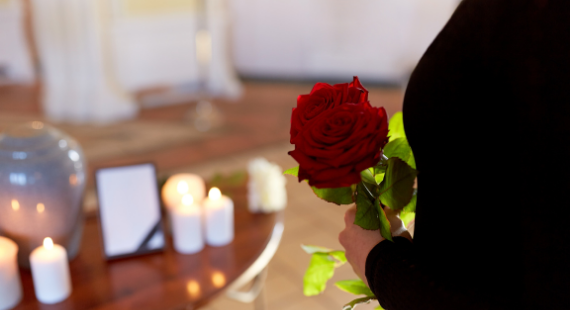
Grieving in the era of COVID-19 can make our usual experiences of bereavement more complicated.
However, as our Consultant Psychiatrist, Professor Jim Lucey, explains, even complicated grief can be mitigated by kindness, and there can be rediscovery of life and hope once more.
This year, more than one and a half million people world-wide lost their lives due to the COVID-19 pandemic and more than 2,000 of these additional deaths occurred here in Ireland. The pain of this loss increased with the social isolation necessarily imposed upon us to contain the viral spread. Our traditional compassionate culture and our deep rituals around death were suspended out of a duty to separate ourselves from contagion.
Grief is visceral. In 2020, at times of sadness, we were not able to reach out to each other, to hold and to care for one another. It’s time to acknowledge that COVID-19 made death and dying more difficult for thousands of people and it made grieving and recovering more difficult for many more.
Tags: Grief Bereavement
It is not easy to grieve, but loss is part of living
The work of Elizabeth Kubler-Ross is often referenced as a description of typical bereavement, but her seminal identification of the stages of grief has been widely misunderstood. It is true that Denial, Anger, Bargaining, Depression and Acceptance may be seen at some time in the aftermath of loss, but there is no normal or right process of grieving. There is no sequence that necessarily applies to everyone, and these are not “stages” in a timed sense. Kubler-Ross did not intend to imply her “stages” should be followed in a serial pattern and they were never meant to indicate a right way to grieve.
The road ahead becomes clearer
Jack became a widower nearly two years ago, when his wife and partner of nearly thirty years died suddenly, tragically and painfully. I asked him what he would want people to know about his grief and this is what he told me.
“Everyone needs to know one thing above all else: things do get better. In time, the pain genuinely gets less, and even terrible pain becomes more bearable than it was at its height. The road ahead becomes clearer”.
This message of hope is the single most important lesson we can learn about grief and it is true now, even after death from COVID-19, and even when our mourning has been delayed and our grieving jeopardised. This is an experience we refer to as "complicated grief"; when grief becomes stuck and new feelings of hopelessness, despair or even suicidality can become attached. In complicated grief, the pain is much slower to ease and the preoccupation with loss deepens. Instead of a gradual recovery and steady re-engagement with life and relationships (the journey most people can expect in time), those with complicated grief remain unable to consider life without their loved one. Their pain remains at a heightened level.
Complicated grief brings more relative recovery goals
Exceptional bereavements make complicated grief more likely. The loss of a child is probably the hardest experience for any adult to bear, and bereavement through suicide or violent crime is also severely stressful. Inconceivable, irreconcilable, ambivalent and unjust departures from this life are immensely more difficult for those left behind. In these circumstances, it may be unreasonable to expect someone to “accept” their loss and so more relative recovery goals may be all that can be anticipated, at least for a time.
Complicated grief is exacerbated by bitterness and disputes. The cynics used to say, “wherever there is a death there is a family, and wherever there is a will, there is a row”. When a funeral is blighted by the settling of old scores or the division of the mourners into the worthy and the unworthy, it is the living who continue to suffer, not the dead.
This is a time to be kind to yourself
COVID-19 has complicated our grief in whole new ways, because it has isolated us from each other when we need to come together most. The good news is that even complicated grief is mitigated by kindness. In time, we will come together (COVID-19 will come to an end) and so it’s important to be prepared now to do things at a later stage.
In time, we will be virus-free and then we will be able to revisit our grief and come together. We will need to do this. The bereaved will appreciate the support of friends and family. Bereavement is an experience that is individual, personal and highly sensitive, but there will be a time when it will be possible to hold one another once again. For now, we are required to stand alone, but hopefully not for long more. So, if you are bereaved and you have social support, then my best advice is to take it any way you can, on social media, in writing or on the phone. This is a time to be kind to yourself.
Take practical steps. Plan a memorial. It will help to anticipate difficult anniversaries, the first Christmas, the birthdays, the empty chair at the dinner table. It is worth taking time to think ahead and to make plans for these especially challenging grieving times.
Seek solace from trusted friends but avoid destructive or illusory comforts. Dismiss those who tell you how to do this or that.
Remember there is no single right way to mourn even after COVID-19.
Being mindful about death helps us to recover
The poet Thomas Lynch wrote memorably about grief in his Life Studies from the Dismal Trade: The Undertaking. His book is a celebrated account of his life and experiences as an undertaker, “burying the dead” in a small town in Michigan in the United States. Lynch helps us to consider the changing culture and language of our modern negotiation with death and dying. In Ireland, the culture is also changing, and it is impossible to be sure what it will become, but, to date, community life in Ireland has been particularly rich regarding respect for the dying and the dead.
There is an increasing tendency to distance ourselves from the physical reality of death. Perhaps there is a tendency to sanitise death, and this may in itself be a kind of denial. People speak now of “passing” or “passing on” as though the words death and dying have become less socially acceptable. These shifts may be indicative. Compared to our parents and our grandparent’s generations, we are far less likely to have kept a dead person in our house for any time or even less likely in our youth to have seen a dead body laid out. Every day, we hear that we are living longer, as though we can expect to live forever, but we are dying no less frequently. The rituals of the wake and of the removal are less certain than ever before, and when we bury our dead, we do so now in graveyards that are no longer marked with headstones pointing towards the heavens. Now, if we bury our dead, their gravestones are laid flat to facilitate the mowing of the lawns.
This may all be necessary and right, but a truthful acknowledgement of death is not something to be feared. Being able to speak the truth about death sets us free in life and helps us to live life more mindfully in what Jon Kabat Zinn has called "full catastrophic reality". Being mindful about our grief lives helps us to be mindful of our proximal death. This cognitive reality prepares us for the real world and helps us to recover more reliably when we are bereaved.
As Thomas Lynch puts it, "he only way around it, is through it". Nobody should be expected just to "move on" from bereavement.
We can rediscover hope once more
This year, COVID-19 has complicated our grief, but even when grief is complicated, we can learn to move through the experience and to move with it throughout our lives. Most bereaved people would agree.
The bereaved will never forget, but even the most complicated bereavement can be followed by the rediscovery of life and hope once more.
More supports and information
You can find more information and support about the issues raised in this piece below.
-
Grief during COVID-19
The Irish Hospice Foundation is providing a Care and Inform Hub with a range of information and resources relating to bereavement during the COVID-19 pandemic. The hub contains support and resources for people who have been bereaved, as well as guides for their friends and supporters, and information for healthcare workers.
-
Grieving process
There are useful links about the topic of grief on several websites and sources, such as from the Health Service Executive or HELPGUIDE.ORG: Coping with Grief and Loss.
-
References
The books referenced here include Thomas Lynch, The Undertaking: Life Studies from the Dismal Trade, and Elizabeth Kubler-Ross, On Death and Dying: What the Dying Have to Teach Doctors, Nurses, Clergy and Their Own Families. These are available in most good book shops. The work of Jon Kabat Zinn is referenced in many publications on mindfulness - for example, Mindfulness: A Practical Guide to Peace in a Frantic World by Penman and Williams, which is also widely available.
Continue to…
Spreading positivity with random acts of kindness
